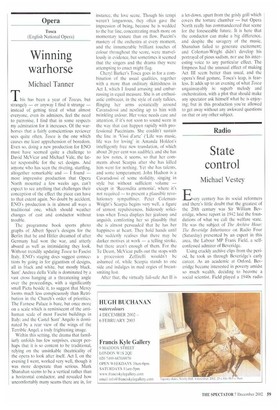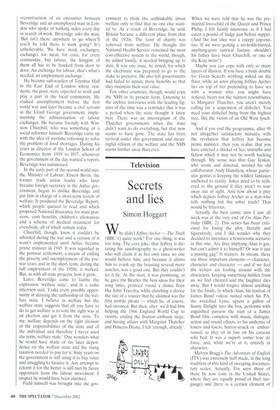Radio
State control
Michael Vestey
Every century has its social reformers and there's little doubt that the greatest of the 20th century was Sir William Beveridge, whose report in 1942 laid the foundations of what we call the welfare state. He was the subject of The Archive Hour: The Beveridge Inherirance on Radio Four (Saturday) presented by an expert in this area, the Labour MP Frank Field, a selfconfessed admirer of Beveridge.
Using crackly archive clips from the period, he took us through Beveridge's early career. As an academic at Oxford, Beveridge became interested in poverty amidst so much wealth, deciding to become a social scientist. Field played a 1940s radio reconstruction of an encounter between Beveridge and an unemployed man in London who spoke of walking miles every day in search of work. Beveridge asks the man, 'But isn't there anywhere to go where'll you'll be told there is work going? It's unbelievable. We have stock exchanges, exchanges for meat, for corn, for every commodity, but labour, the kingpin of them all has to be hawked from door to door. An exchange for labour, that's what's needed, an employment exchange.'
He became sub-warden of Toynbee Hall in the East End of London where residents, the poor, were expected to work and play a part in the local community. He studied unemployment before the first world war and later became a civil servant in the Lloyd George government, implementing the administration of labour exchanges. He became friendly with Winston Churchill, who was something of a social reformer himself. Beveridge came up with the idea of wartime rationing to solve the problem of food shortages. During his years as director of the London School of Economics from 1919 to 1937, whenever the government of the day wanted a report, Beveridge was summoned.
In the early part of the second world war, the Minister of Labour, Ernest Bevin, the former trade union leader who later became foreign secretary in the Attlee government, began to dislike Beveridge and put him in charge of a short-term review of welfare, It produced the Beveridge Report, which people queued to read and which proposed National Insurance for state pensions, cash benefits, children's allowances and a scheme of medical treatment for everybody, all of which remain today.
Churchill, though, knew it couldn't be afforded during the war and a version of it wasn't implemented until Attlee became prime minister in 1945. It was regarded as the postwar settlement, a means of ending the poverty and unemployment of the prewar years and in the short term, during the full employment of the 1950s, it worked. But, as with all state projects, how it grew.
Later, Beveridge came to loathe the expression 'welfare state', and in a radio interview said, 'I take every possible opportunity in denying the authorship of the welfare state. I believe in welfare but the welfare state suggests that all you have to do to get welfare is to vote the right way at an election and get it from the state. To me, welfare depends on the right division of the responsibilities of the state and of the individual and therefore I never used the term, welfare state.' One wonders what he would have made of the later dependence on the welfare state and the rising taxation needed to pay for it. Sixty years on the government is still using it to buy votes and struggling to finance it. Any attempt to reform it for the better is still met by fierce opposition from the labour movement. I suspect he would have been alarmed.
Field himself was brought into the gov
ernment to think the unthinkable about welfare only to find that no one else wanted to. As a result of Beveridge, he said. Britain became a different place from that of the 1920s. The taint of charity was removed from welfare. He thought the National Health Service remained the most cost-effective system in the world, though, he added hastily, it needed bringing up to date. It was one issue, he noted, for which the electorate was prepared to go to the stake to preserve. He also felt governments had failed to uprate these benefits so that they maintain their real value.
Few other countries, though, would copy the NHS in its present form. Listening to the archive interviews with the leading figures of the time was a reminder that it was a period when the state thought it knew best. There was an interregnum of the Thatcher governments when the state didn't want to do everything, but that now seems to have gone. The state has been revived under this government and meaningful reform of the welfare and the NHS seems further away than ever.











































































 Previous page
Previous page